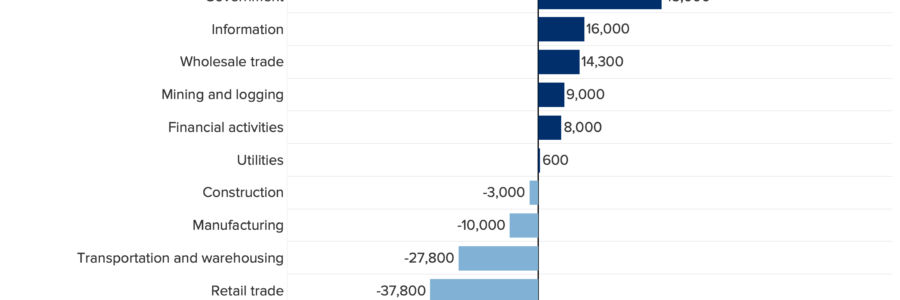
Here's where the jobs are — in one chart
- CNBC studied the industry-by-industry employment changes in the January 2021 jobs report.
- Restaurants and bars cut 19,400 jobs, while hotels, resorts and other businesses in the lodging industry lost 18,300.
- Professional and business services, a broad sector that encompasses a wide swath of workers, posted a healthy gain of 97,000 in January.
- There was stronger hiring among computer system designers (11,300) and consultants (16,100) last month, as well as decent gains for scientists working in research and development units (10,000) across the country.
The U.S. economy managed to eke out job gains in January, but analysis of each industry's employment changes shows a labor market still struggling with the impact of the coronavirus pandemic.
The Labor Department reported Friday that total nonfarm payroll employment rose by 49,000 last month, an anemic start to the year as employers in the leisure and hospitality sector continued to cut staff during in the winter season. The unemployment rate fell to 6.3%.
The slight rise in total payroll employment fell just short of the 50,000 gain that economists had forecast and came after December's net loss.
CNBC studied the net changes by industry for January jobs based on data contained in the employment report.
The leisure and hospitality sector again saw the worst of the declines with a loss of 61,000 positions. But unlike in December, the sector's losses in January were more evenly spread across subindustries.
Restaurants and bars cut 19,400 jobs, while hotels, resorts and other businesses in the lodging industry lost 18,300. The gambling and recreation industry shed 26,900 jobs.
The loss of 61,000 across the entire leisure and hospitality sector may have marked the worst among any industry for the month, but it nonetheless represented a vast improvement from the loss of 536,000 jobs it suffered in December.
"Employment in food services and drinking places continued to trend down," the Labor Department said in a release. "Employment in leisure and hospitality fell by 8.2 million during March and April, increased by 4.9 million from May to November, and then declined by 597,000 over the past 2 months."
"Since February, employment in leisure and hospitality is down by 3.9 million, or 22.9 percent," the government report said.
Restaurants across the country have cut staff as colder weather keeps patrons away from outdoor dining options or restrictions force eateries to operate indoor dining at limited capacity to help slow the spread of Covid-19.
The health care and social assistance sector also had a tough month with job losses occurring in nursing care facilities (-19,000), home health care services (-13,000) and community care facilities for the elderly (-7,000). Since February, health care employment is down by 542,000.
The sector saw a decline of 40,800 positions.
"The net net…not a great number, but still consistent with a trough in labor market data. Which is what we are seeing in claims as well," wrote Evercore ISI strategist Dennis DeBusschere. "Also, Jan is a terrible payroll month. Lots of seasonality in the number. … So keep that in mind."
Partially offsetting those losses was healthy hiring in the professional and business sector as well as among government ranks.
Professional and business services, a broad sector that encompasses a wide swath of workers, posted a healthy gain of 97,000 in January.
There was stronger hiring among computer system designers (11,300) and consultants (16,100) last month, as well as decent gains for scientists working in research and development units (10,000) across the country.
The headline 97,000 number also included a flurry of hiring among temporary help services workers. These workers, while technically employees of a temporary help agency or service, are often assigned to other businesses on a temporary basis to supplement that firm's workforce.
The temporary help subindustry added 80,900 jobs in January.
Government saw a solid uptick in hiring as well with a net gain of 43,000. The Labor Department said local government education (such as public high schools) rose by 49,000 while state government education (such as public universities) added 36,000.
— CNBC's Nate Rattner and Crystal Mercedes contributed reporting.
Source: Read Full Article